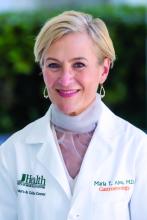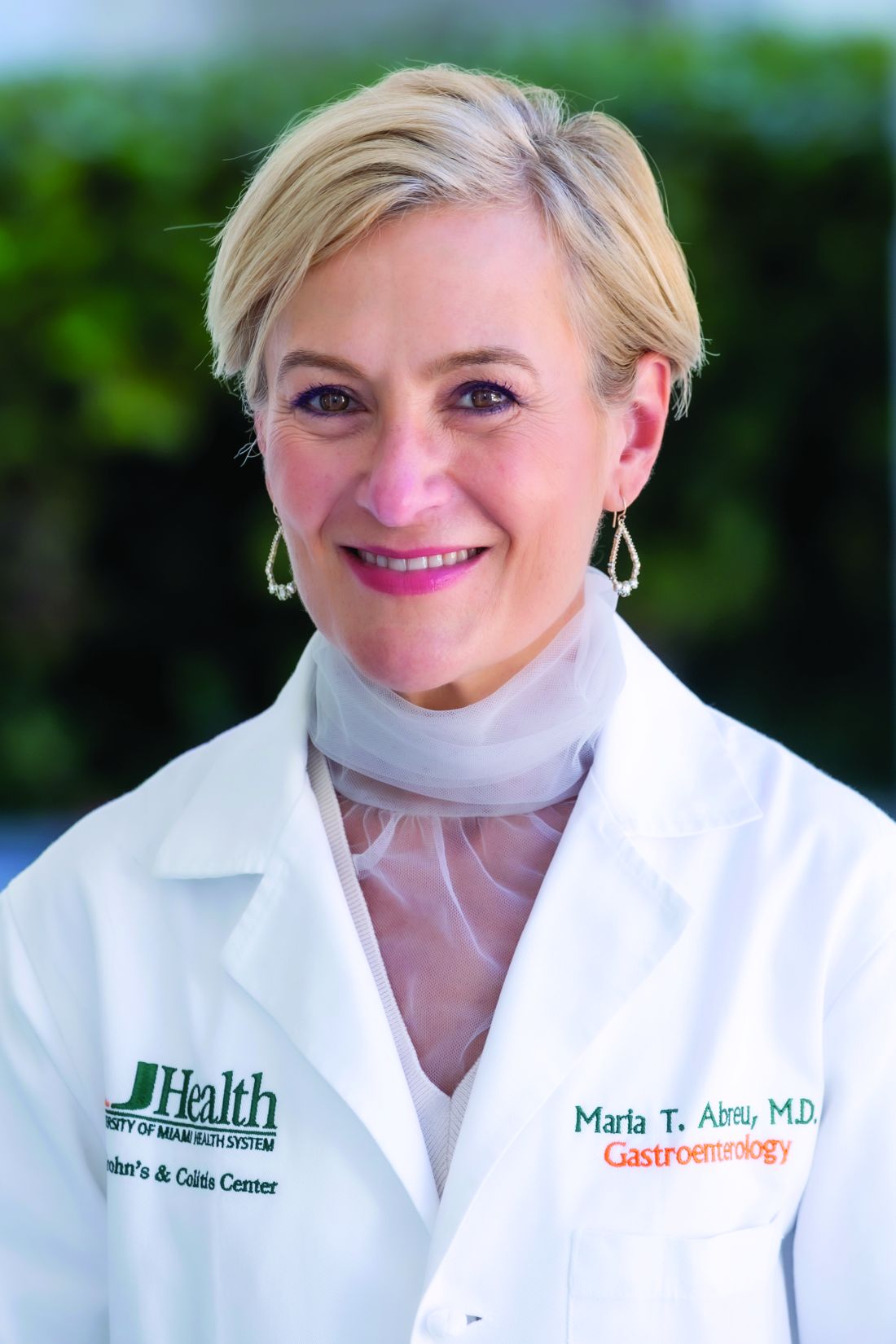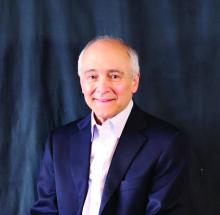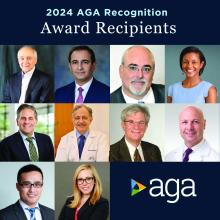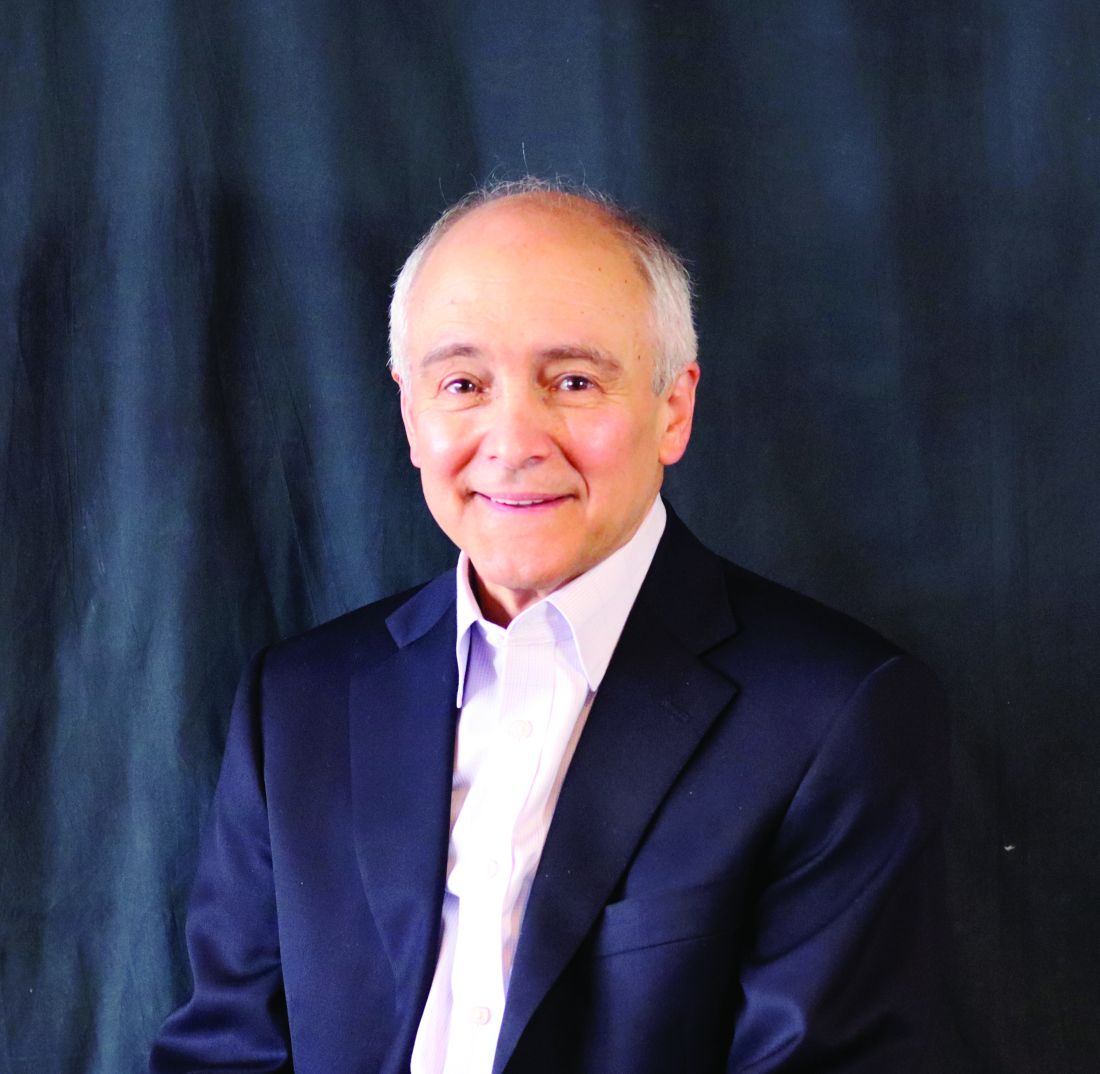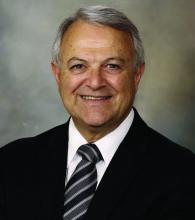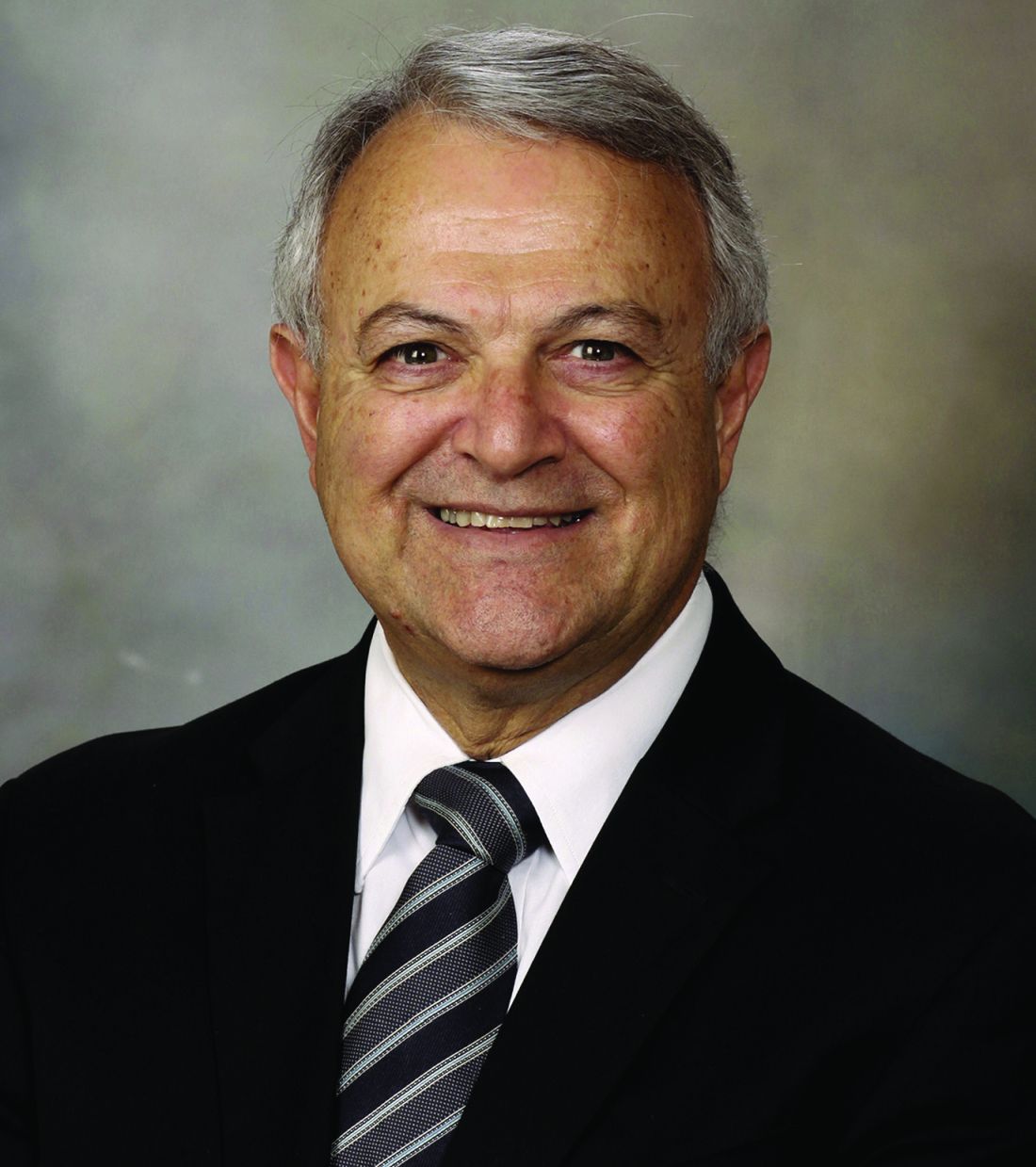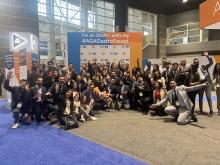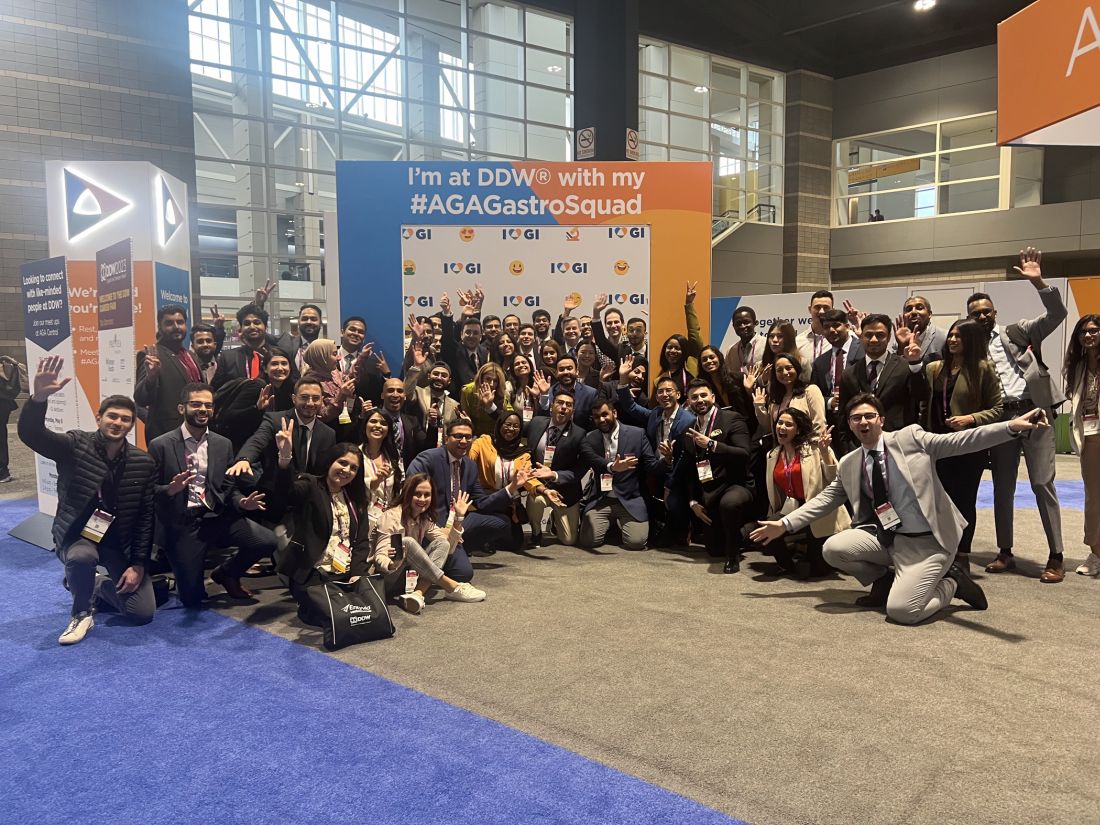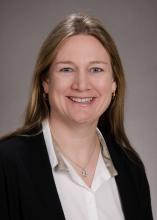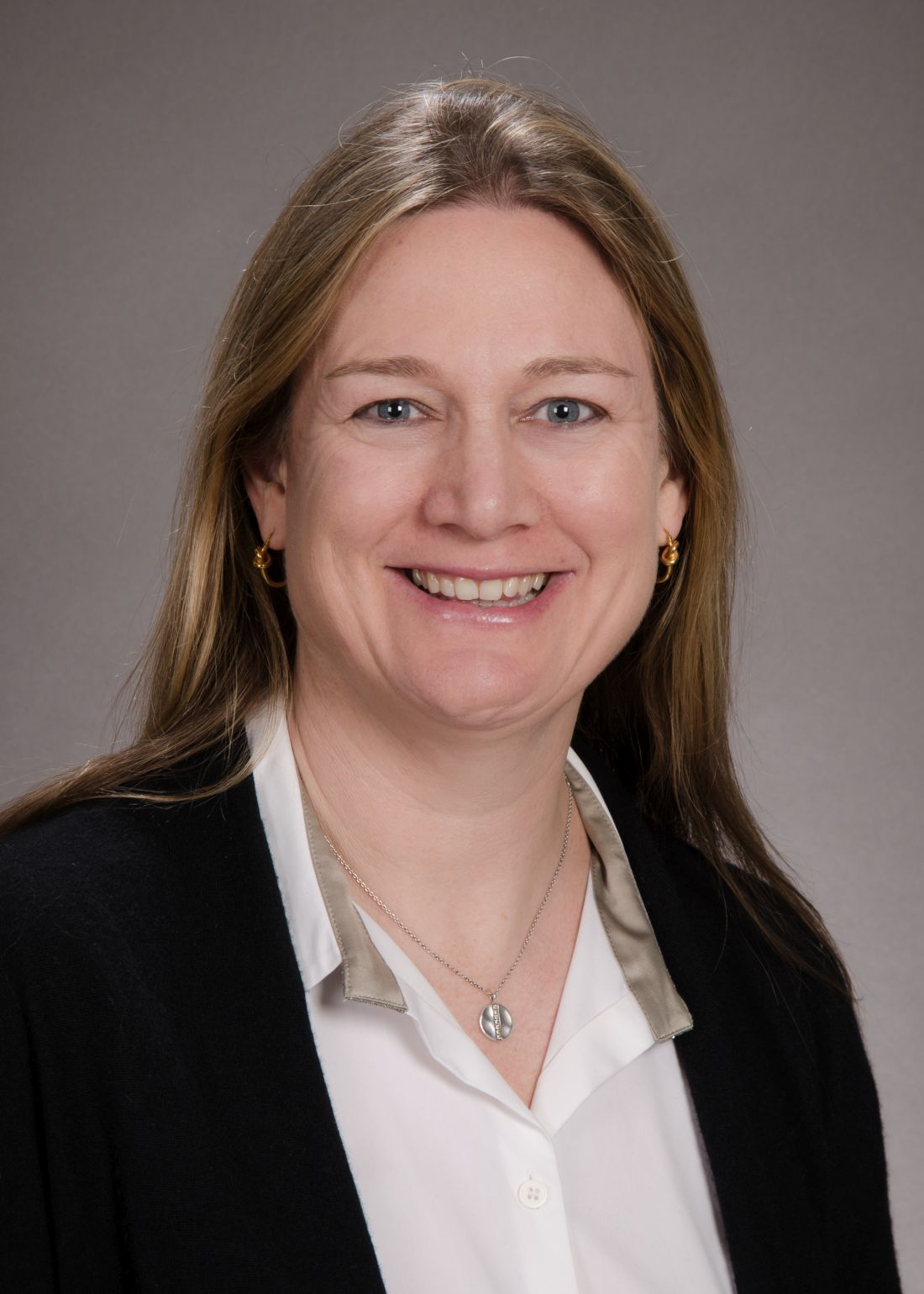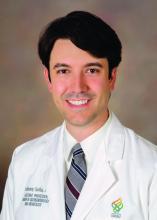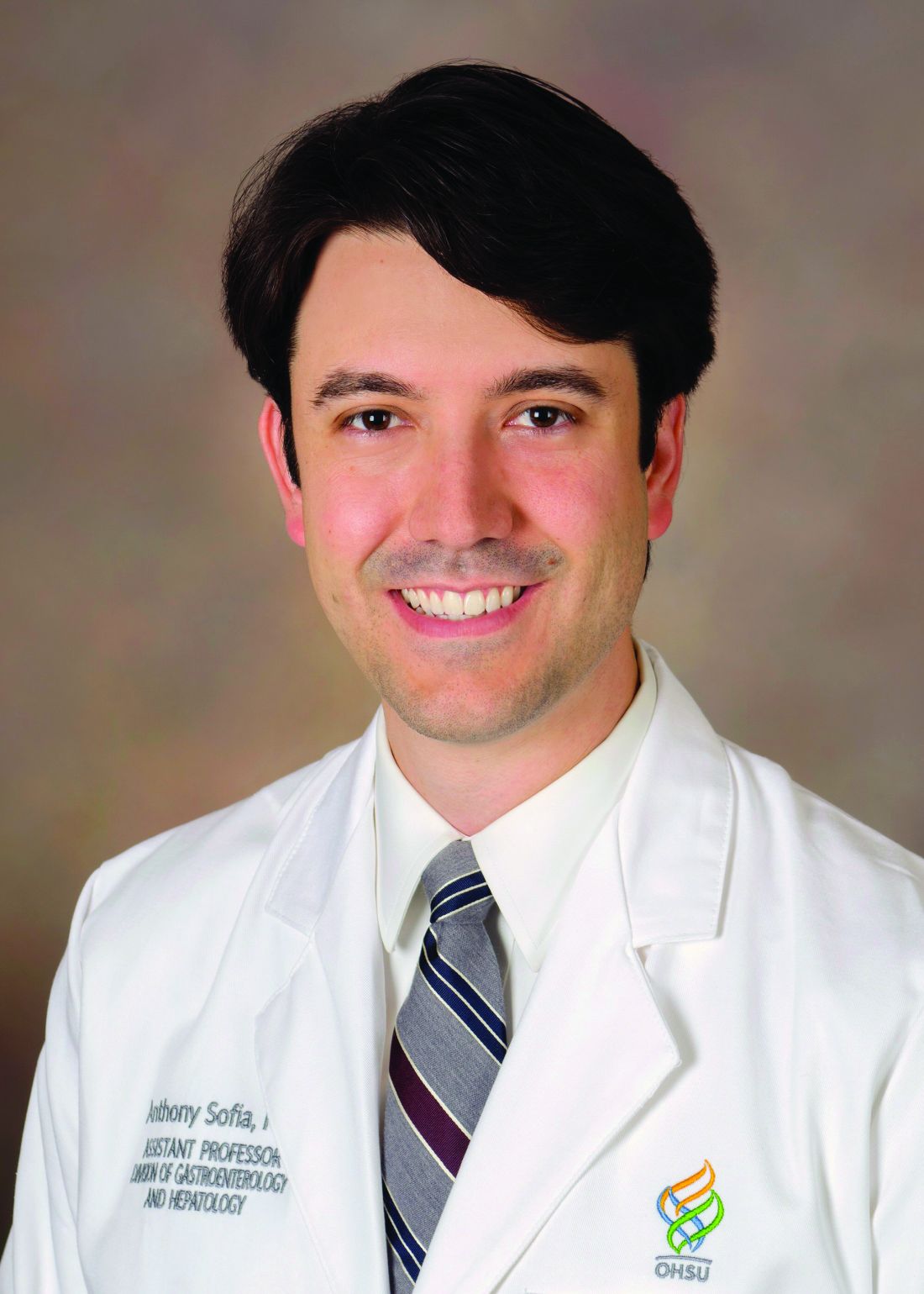User login
Congratulations to the 2024 AGA Research Foundation awardees!
The program serves as a catalyst for discovery and career growth among the most promising researchers in gastroenterology and hepatology.
“This year’s awardees are an exceptional group of investigators who are committed to furthering patient care through research,” said Michael Camilleri, MD, AGAF, chair, AGA Research Foundation. “The AGA Research Foundation is proud to fund these investigators and their ongoing efforts to advance GI research at a critical time in their careers. We believe the Foundation’s investment will ultimately enable new discoveries in gastroenterology and hepatology that will benefit patients.”
Treatment options for digestive diseases begin with vigorous research. The AGA Research Foundation supports medical investigators as they advance our understanding of gastrointestinal and liver conditions. Here are this year’s award recipients:
RESEARCH SCHOLAR AWARDS
AGA Research Scholar Award
- Karen Jane Dunbar, PhD, Columbia University, New York, New York
- Aaron Hecht, MD, PhD, Hospital of the University of Pennsylvania, Philadelphia, Pennsylvania
- Sarah Maxwell, MD, University of California, San Francisco
- Chung Sang Tse, MD, University of Pennsylvania, Philadelphia, Pennsylvania
- Jason (Yanjia) Zhang, MD, PhD, Boston Children’s Hospital, Massachusetts
AGA-Bristol Myers Squibb Research Scholar Award in Inflammatory Bowel Disease
- Joseph R. Burclaff, PhD, University of North Carolina at Chapel Hill
SPECIALTY AWARDS
AGA-Caroline Craig Augustyn & Damian Augustyn Award in Digestive Cancer
- Swathi Eluri, MD, MSCR, Mayo Clinic, Rochester, Minnesota
AGA-R. Robert & Sally Funderburg Research Award in Gastric Cancer
- Jianwen Que, MD, PhD, Columbia University, New York, New York
AGA-Pfizer Fellowship-to-Faculty Transition Award
- Lianna Wood, MD, PhD, Boston Children’s Hospital, Massachusetts
AGA-Ironwood Fellowship-to-Faculty Transition Award
- ZeNan Li Chang, MD, PhD, Washington University School of Medicine, St. Louis, Missouri
PILOT AWARDS
AGA Pilot Research Award
- Linda C. Cummings, MD, MS, University Hospitals Cleveland Medical Center, Cleveland, Ohio
- Pooja Mehta, MD, MSCS, University of Colorado Denver
- Guilherme Piovezani Ramos, MD, Boston Children’s Hospital
- Simon Schwoerer, PhD, University of Chicago, Illinois
- Yankai Wen, PhD, University of Texas Health Science Center at Houston
AGA-Pfizer Pilot Research Award in Non-Alcoholic Steatohepatitis
- Alice Cheng, PhD, Stanford University, California
- Petra Hirsova, PhD, PharmD, Mayo Clinic, Rochester, Minnesota
- Sarah Maxwell, MD, University of California, San Francisco
AGA-Pfizer Pilot Research Award in Inflammatory Bowel Disease
- David Boone, PhD, Indiana University, Indianapolis, Indiana
- Sara Chloe Di Rienzi, PhD, Baylor College of Medicine, Houston, Texas
- Jared Andrew Sninsky, MD, MSCR, Baylor College of Medicine, Houston, Texas
UNDERGRADUATE RESEARCH AWARDS
AGA-Aman Armaan Ahmed Family Surf for Success Program
- Eli Burstein, Yeshiva University, New York, New York
- Chloe Carlisle, University of Florida, Gainesville, Florida
- Adna Hassan, University of Minnesota Rochester
- Nicole Rodriguez Hilario, Barry University, Miami, Florida
- Maryam Jimoh, College of Wooster, Wooster, Ohio
- Viktoriya Kalinina, Brandeis University, Waltham, Massachusetts
AGA-Dr. Harvey Young Education & Development Foundation’s Young Guts Scholar Program
- Rafaella Lavalle Lacerda de Almeida, Michigan State University, East Lansing, Michigan
- Lara Cheesman, John’s Hopkins University School of Medicine, Baltimore, Maryland
- Cass Condray, University of Oklahoma, Norman, Oklahoma
- Daniel Juarez, Columbia University, New York, New York
- Jason Lin, University of Michigan, Ann Arbor, Michigan
- Riya Malhotra, Case Western Reserve University, Cleveland, Ohio
- Brian Nguyen, Brown University, Providence, Rhode Island
- Mahmoud (Moudy) Salem, Stony Brook University, Stony Brook, New York
ABSTRACT AWARDS
AGA Fellow Abstract of the Year Award
- Andrea Tou, MD Children’s Hospital of Philadelphia, Pennsylvania
AGA Fellow Abstract Awards
- Manik Aggarwal, MBBS, Mayo Clinic, Rochester, Minnesota
- Kole Buckley, PhD, University of Pennsylvania, Philadelphia, Pennsylvania
- Jane Ha, MD, Massachusetts General Hospital, Boston, Massachusetts
- Brent Hiramoto, MD, Brigham and Women’s Hospital, Boston, Massachusetts
- Md Obaidul Islam, PhD, University of Miami, Coral Gables, Florida
- Kanak Kennedy, MD, MPH, Children’s Hospital of Philadelphia, Pennsylvania
- Hanseul Kim, PhD, MS, Massachusetts General Hospital, Boston, Massachusetts
- Chiraag Kulkarni, MD, Stanford University, Stanford, California
- Su-Hyung Lee, PhD, DVM, Vanderbilt University Medical Center, Nashville, Tennessee
- Caroline Muiler, PhD, Yale School of Medicine, New Haven, Connecticut
- Sarah Najjar, PhD, New York University, New York, New York
- Ronaldo Panganiban, MD, PhD Penn State Hershey Medical Center, Hershey, Pennsylvania
- Perseus Patel, MD, Stanford University, California
- Hassan Sinan, MD, Johns Hopkins University, Baltimore, Maryland
- Patricia Snarski, PhD, Tulane University, New Orleans, Louisiana
- Fernando Vicentini, PhD, MS, McMaster University, Hamilton, Ontario, Canada
- Remington Winter, MD, University of Manitoba – Health Sciences Centre, Winnipeg, Manitoba, Canada
- Tiaosi Xing, PhD, MBBS, MS, Penn State College of Medicine, Hershey, Pennsylvania
AGA Student Abstract of the Year Award
- Jazmyne Jackson, Temple University, Philadelphia, Pennsylvania
AGA Student Abstract Award
- Valentina Alvarez, University of Washington School of Medicine, Seattle, Washington
- Yasaman Bahojb Habibyan, MS, University of Calgary, Alberta, Canada
- Tessa Herman, MD, University of Minnesota, Minneapolis-Saint Paul, Minnesota
- Jason Jin, Yale School of Medicine, New Haven, Connecticut
- Frederikke Larsen, Western University, London, Ontario, Canada
- Kara McNamara, Vanderbilt University, Nashville, Tennessee
- Julia Sessions, MD, University of Virginia, Charlottesville, Virginia
- Scott Silvey, MS, Virginia Commonwealth University, Richmond, Virginia
- Vijaya Sundaram, Marshall University School of Medicine, Huntington, West Virginia
- Kafayat Yusuf, MS, University of Kansas Medical Center, Kansas City, Kansas
AGA–Eric Esrailian Student Abstract Prize
- Brent Gawey, MD, MS, Mayo Clinic, Rochester, Minnesota
- Fei Li, MBBS, MS, University of Michigan, Ann Arbor, Michigan
- Emily Wong, University of Toronto, Ontario, Canada
- Jordan Woodard, MD, Prisma Health – Upstate, Greenville, South Carolina
AGA–Radhika Srinivasan Student Abstract Prize
- Raz Abdulqadir, MS, Penn State College of Medicine, Hershey, Pennsylvania
- Rebecca Ekeanyanwu, MHS, Meharry Medical College, Nashville, Tennessee
- Jared Morris, MD, University of Manitoba, Winnipeg City, Manitoba, Canada
- Rachel Stubler, Medical University of South Carolina, Charleston, South Carolina
AGA Abstract Award for Health Disparities Research
- Saqr Alsakarneh, MD University of Missouri-Kansas City
- Marco Noriega, MD, Beth Israel Deaconess Medical Center, Boston, Massachusetts
- Temitope Olasehinde, MD, University Hospitals/Case Western Reserve University, Cleveland, Ohio
- Gabrielle Waclawik, MD, MPH, University of Wisconsin, Madison, Wisconsin
AGA-Moti L. & Kamla Rustgi International Travel Award
- W. Keith Tan, MBChB, University of Cambridge, Cambridge, England
- Elsa van Liere, MD Amsterdam Universitair Medische Centra, Amsterdam, Netherlands
The program serves as a catalyst for discovery and career growth among the most promising researchers in gastroenterology and hepatology.
“This year’s awardees are an exceptional group of investigators who are committed to furthering patient care through research,” said Michael Camilleri, MD, AGAF, chair, AGA Research Foundation. “The AGA Research Foundation is proud to fund these investigators and their ongoing efforts to advance GI research at a critical time in their careers. We believe the Foundation’s investment will ultimately enable new discoveries in gastroenterology and hepatology that will benefit patients.”
Treatment options for digestive diseases begin with vigorous research. The AGA Research Foundation supports medical investigators as they advance our understanding of gastrointestinal and liver conditions. Here are this year’s award recipients:
RESEARCH SCHOLAR AWARDS
AGA Research Scholar Award
- Karen Jane Dunbar, PhD, Columbia University, New York, New York
- Aaron Hecht, MD, PhD, Hospital of the University of Pennsylvania, Philadelphia, Pennsylvania
- Sarah Maxwell, MD, University of California, San Francisco
- Chung Sang Tse, MD, University of Pennsylvania, Philadelphia, Pennsylvania
- Jason (Yanjia) Zhang, MD, PhD, Boston Children’s Hospital, Massachusetts
AGA-Bristol Myers Squibb Research Scholar Award in Inflammatory Bowel Disease
- Joseph R. Burclaff, PhD, University of North Carolina at Chapel Hill
SPECIALTY AWARDS
AGA-Caroline Craig Augustyn & Damian Augustyn Award in Digestive Cancer
- Swathi Eluri, MD, MSCR, Mayo Clinic, Rochester, Minnesota
AGA-R. Robert & Sally Funderburg Research Award in Gastric Cancer
- Jianwen Que, MD, PhD, Columbia University, New York, New York
AGA-Pfizer Fellowship-to-Faculty Transition Award
- Lianna Wood, MD, PhD, Boston Children’s Hospital, Massachusetts
AGA-Ironwood Fellowship-to-Faculty Transition Award
- ZeNan Li Chang, MD, PhD, Washington University School of Medicine, St. Louis, Missouri
PILOT AWARDS
AGA Pilot Research Award
- Linda C. Cummings, MD, MS, University Hospitals Cleveland Medical Center, Cleveland, Ohio
- Pooja Mehta, MD, MSCS, University of Colorado Denver
- Guilherme Piovezani Ramos, MD, Boston Children’s Hospital
- Simon Schwoerer, PhD, University of Chicago, Illinois
- Yankai Wen, PhD, University of Texas Health Science Center at Houston
AGA-Pfizer Pilot Research Award in Non-Alcoholic Steatohepatitis
- Alice Cheng, PhD, Stanford University, California
- Petra Hirsova, PhD, PharmD, Mayo Clinic, Rochester, Minnesota
- Sarah Maxwell, MD, University of California, San Francisco
AGA-Pfizer Pilot Research Award in Inflammatory Bowel Disease
- David Boone, PhD, Indiana University, Indianapolis, Indiana
- Sara Chloe Di Rienzi, PhD, Baylor College of Medicine, Houston, Texas
- Jared Andrew Sninsky, MD, MSCR, Baylor College of Medicine, Houston, Texas
UNDERGRADUATE RESEARCH AWARDS
AGA-Aman Armaan Ahmed Family Surf for Success Program
- Eli Burstein, Yeshiva University, New York, New York
- Chloe Carlisle, University of Florida, Gainesville, Florida
- Adna Hassan, University of Minnesota Rochester
- Nicole Rodriguez Hilario, Barry University, Miami, Florida
- Maryam Jimoh, College of Wooster, Wooster, Ohio
- Viktoriya Kalinina, Brandeis University, Waltham, Massachusetts
AGA-Dr. Harvey Young Education & Development Foundation’s Young Guts Scholar Program
- Rafaella Lavalle Lacerda de Almeida, Michigan State University, East Lansing, Michigan
- Lara Cheesman, John’s Hopkins University School of Medicine, Baltimore, Maryland
- Cass Condray, University of Oklahoma, Norman, Oklahoma
- Daniel Juarez, Columbia University, New York, New York
- Jason Lin, University of Michigan, Ann Arbor, Michigan
- Riya Malhotra, Case Western Reserve University, Cleveland, Ohio
- Brian Nguyen, Brown University, Providence, Rhode Island
- Mahmoud (Moudy) Salem, Stony Brook University, Stony Brook, New York
ABSTRACT AWARDS
AGA Fellow Abstract of the Year Award
- Andrea Tou, MD Children’s Hospital of Philadelphia, Pennsylvania
AGA Fellow Abstract Awards
- Manik Aggarwal, MBBS, Mayo Clinic, Rochester, Minnesota
- Kole Buckley, PhD, University of Pennsylvania, Philadelphia, Pennsylvania
- Jane Ha, MD, Massachusetts General Hospital, Boston, Massachusetts
- Brent Hiramoto, MD, Brigham and Women’s Hospital, Boston, Massachusetts
- Md Obaidul Islam, PhD, University of Miami, Coral Gables, Florida
- Kanak Kennedy, MD, MPH, Children’s Hospital of Philadelphia, Pennsylvania
- Hanseul Kim, PhD, MS, Massachusetts General Hospital, Boston, Massachusetts
- Chiraag Kulkarni, MD, Stanford University, Stanford, California
- Su-Hyung Lee, PhD, DVM, Vanderbilt University Medical Center, Nashville, Tennessee
- Caroline Muiler, PhD, Yale School of Medicine, New Haven, Connecticut
- Sarah Najjar, PhD, New York University, New York, New York
- Ronaldo Panganiban, MD, PhD Penn State Hershey Medical Center, Hershey, Pennsylvania
- Perseus Patel, MD, Stanford University, California
- Hassan Sinan, MD, Johns Hopkins University, Baltimore, Maryland
- Patricia Snarski, PhD, Tulane University, New Orleans, Louisiana
- Fernando Vicentini, PhD, MS, McMaster University, Hamilton, Ontario, Canada
- Remington Winter, MD, University of Manitoba – Health Sciences Centre, Winnipeg, Manitoba, Canada
- Tiaosi Xing, PhD, MBBS, MS, Penn State College of Medicine, Hershey, Pennsylvania
AGA Student Abstract of the Year Award
- Jazmyne Jackson, Temple University, Philadelphia, Pennsylvania
AGA Student Abstract Award
- Valentina Alvarez, University of Washington School of Medicine, Seattle, Washington
- Yasaman Bahojb Habibyan, MS, University of Calgary, Alberta, Canada
- Tessa Herman, MD, University of Minnesota, Minneapolis-Saint Paul, Minnesota
- Jason Jin, Yale School of Medicine, New Haven, Connecticut
- Frederikke Larsen, Western University, London, Ontario, Canada
- Kara McNamara, Vanderbilt University, Nashville, Tennessee
- Julia Sessions, MD, University of Virginia, Charlottesville, Virginia
- Scott Silvey, MS, Virginia Commonwealth University, Richmond, Virginia
- Vijaya Sundaram, Marshall University School of Medicine, Huntington, West Virginia
- Kafayat Yusuf, MS, University of Kansas Medical Center, Kansas City, Kansas
AGA–Eric Esrailian Student Abstract Prize
- Brent Gawey, MD, MS, Mayo Clinic, Rochester, Minnesota
- Fei Li, MBBS, MS, University of Michigan, Ann Arbor, Michigan
- Emily Wong, University of Toronto, Ontario, Canada
- Jordan Woodard, MD, Prisma Health – Upstate, Greenville, South Carolina
AGA–Radhika Srinivasan Student Abstract Prize
- Raz Abdulqadir, MS, Penn State College of Medicine, Hershey, Pennsylvania
- Rebecca Ekeanyanwu, MHS, Meharry Medical College, Nashville, Tennessee
- Jared Morris, MD, University of Manitoba, Winnipeg City, Manitoba, Canada
- Rachel Stubler, Medical University of South Carolina, Charleston, South Carolina
AGA Abstract Award for Health Disparities Research
- Saqr Alsakarneh, MD University of Missouri-Kansas City
- Marco Noriega, MD, Beth Israel Deaconess Medical Center, Boston, Massachusetts
- Temitope Olasehinde, MD, University Hospitals/Case Western Reserve University, Cleveland, Ohio
- Gabrielle Waclawik, MD, MPH, University of Wisconsin, Madison, Wisconsin
AGA-Moti L. & Kamla Rustgi International Travel Award
- W. Keith Tan, MBChB, University of Cambridge, Cambridge, England
- Elsa van Liere, MD Amsterdam Universitair Medische Centra, Amsterdam, Netherlands
The program serves as a catalyst for discovery and career growth among the most promising researchers in gastroenterology and hepatology.
“This year’s awardees are an exceptional group of investigators who are committed to furthering patient care through research,” said Michael Camilleri, MD, AGAF, chair, AGA Research Foundation. “The AGA Research Foundation is proud to fund these investigators and their ongoing efforts to advance GI research at a critical time in their careers. We believe the Foundation’s investment will ultimately enable new discoveries in gastroenterology and hepatology that will benefit patients.”
Treatment options for digestive diseases begin with vigorous research. The AGA Research Foundation supports medical investigators as they advance our understanding of gastrointestinal and liver conditions. Here are this year’s award recipients:
RESEARCH SCHOLAR AWARDS
AGA Research Scholar Award
- Karen Jane Dunbar, PhD, Columbia University, New York, New York
- Aaron Hecht, MD, PhD, Hospital of the University of Pennsylvania, Philadelphia, Pennsylvania
- Sarah Maxwell, MD, University of California, San Francisco
- Chung Sang Tse, MD, University of Pennsylvania, Philadelphia, Pennsylvania
- Jason (Yanjia) Zhang, MD, PhD, Boston Children’s Hospital, Massachusetts
AGA-Bristol Myers Squibb Research Scholar Award in Inflammatory Bowel Disease
- Joseph R. Burclaff, PhD, University of North Carolina at Chapel Hill
SPECIALTY AWARDS
AGA-Caroline Craig Augustyn & Damian Augustyn Award in Digestive Cancer
- Swathi Eluri, MD, MSCR, Mayo Clinic, Rochester, Minnesota
AGA-R. Robert & Sally Funderburg Research Award in Gastric Cancer
- Jianwen Que, MD, PhD, Columbia University, New York, New York
AGA-Pfizer Fellowship-to-Faculty Transition Award
- Lianna Wood, MD, PhD, Boston Children’s Hospital, Massachusetts
AGA-Ironwood Fellowship-to-Faculty Transition Award
- ZeNan Li Chang, MD, PhD, Washington University School of Medicine, St. Louis, Missouri
PILOT AWARDS
AGA Pilot Research Award
- Linda C. Cummings, MD, MS, University Hospitals Cleveland Medical Center, Cleveland, Ohio
- Pooja Mehta, MD, MSCS, University of Colorado Denver
- Guilherme Piovezani Ramos, MD, Boston Children’s Hospital
- Simon Schwoerer, PhD, University of Chicago, Illinois
- Yankai Wen, PhD, University of Texas Health Science Center at Houston
AGA-Pfizer Pilot Research Award in Non-Alcoholic Steatohepatitis
- Alice Cheng, PhD, Stanford University, California
- Petra Hirsova, PhD, PharmD, Mayo Clinic, Rochester, Minnesota
- Sarah Maxwell, MD, University of California, San Francisco
AGA-Pfizer Pilot Research Award in Inflammatory Bowel Disease
- David Boone, PhD, Indiana University, Indianapolis, Indiana
- Sara Chloe Di Rienzi, PhD, Baylor College of Medicine, Houston, Texas
- Jared Andrew Sninsky, MD, MSCR, Baylor College of Medicine, Houston, Texas
UNDERGRADUATE RESEARCH AWARDS
AGA-Aman Armaan Ahmed Family Surf for Success Program
- Eli Burstein, Yeshiva University, New York, New York
- Chloe Carlisle, University of Florida, Gainesville, Florida
- Adna Hassan, University of Minnesota Rochester
- Nicole Rodriguez Hilario, Barry University, Miami, Florida
- Maryam Jimoh, College of Wooster, Wooster, Ohio
- Viktoriya Kalinina, Brandeis University, Waltham, Massachusetts
AGA-Dr. Harvey Young Education & Development Foundation’s Young Guts Scholar Program
- Rafaella Lavalle Lacerda de Almeida, Michigan State University, East Lansing, Michigan
- Lara Cheesman, John’s Hopkins University School of Medicine, Baltimore, Maryland
- Cass Condray, University of Oklahoma, Norman, Oklahoma
- Daniel Juarez, Columbia University, New York, New York
- Jason Lin, University of Michigan, Ann Arbor, Michigan
- Riya Malhotra, Case Western Reserve University, Cleveland, Ohio
- Brian Nguyen, Brown University, Providence, Rhode Island
- Mahmoud (Moudy) Salem, Stony Brook University, Stony Brook, New York
ABSTRACT AWARDS
AGA Fellow Abstract of the Year Award
- Andrea Tou, MD Children’s Hospital of Philadelphia, Pennsylvania
AGA Fellow Abstract Awards
- Manik Aggarwal, MBBS, Mayo Clinic, Rochester, Minnesota
- Kole Buckley, PhD, University of Pennsylvania, Philadelphia, Pennsylvania
- Jane Ha, MD, Massachusetts General Hospital, Boston, Massachusetts
- Brent Hiramoto, MD, Brigham and Women’s Hospital, Boston, Massachusetts
- Md Obaidul Islam, PhD, University of Miami, Coral Gables, Florida
- Kanak Kennedy, MD, MPH, Children’s Hospital of Philadelphia, Pennsylvania
- Hanseul Kim, PhD, MS, Massachusetts General Hospital, Boston, Massachusetts
- Chiraag Kulkarni, MD, Stanford University, Stanford, California
- Su-Hyung Lee, PhD, DVM, Vanderbilt University Medical Center, Nashville, Tennessee
- Caroline Muiler, PhD, Yale School of Medicine, New Haven, Connecticut
- Sarah Najjar, PhD, New York University, New York, New York
- Ronaldo Panganiban, MD, PhD Penn State Hershey Medical Center, Hershey, Pennsylvania
- Perseus Patel, MD, Stanford University, California
- Hassan Sinan, MD, Johns Hopkins University, Baltimore, Maryland
- Patricia Snarski, PhD, Tulane University, New Orleans, Louisiana
- Fernando Vicentini, PhD, MS, McMaster University, Hamilton, Ontario, Canada
- Remington Winter, MD, University of Manitoba – Health Sciences Centre, Winnipeg, Manitoba, Canada
- Tiaosi Xing, PhD, MBBS, MS, Penn State College of Medicine, Hershey, Pennsylvania
AGA Student Abstract of the Year Award
- Jazmyne Jackson, Temple University, Philadelphia, Pennsylvania
AGA Student Abstract Award
- Valentina Alvarez, University of Washington School of Medicine, Seattle, Washington
- Yasaman Bahojb Habibyan, MS, University of Calgary, Alberta, Canada
- Tessa Herman, MD, University of Minnesota, Minneapolis-Saint Paul, Minnesota
- Jason Jin, Yale School of Medicine, New Haven, Connecticut
- Frederikke Larsen, Western University, London, Ontario, Canada
- Kara McNamara, Vanderbilt University, Nashville, Tennessee
- Julia Sessions, MD, University of Virginia, Charlottesville, Virginia
- Scott Silvey, MS, Virginia Commonwealth University, Richmond, Virginia
- Vijaya Sundaram, Marshall University School of Medicine, Huntington, West Virginia
- Kafayat Yusuf, MS, University of Kansas Medical Center, Kansas City, Kansas
AGA–Eric Esrailian Student Abstract Prize
- Brent Gawey, MD, MS, Mayo Clinic, Rochester, Minnesota
- Fei Li, MBBS, MS, University of Michigan, Ann Arbor, Michigan
- Emily Wong, University of Toronto, Ontario, Canada
- Jordan Woodard, MD, Prisma Health – Upstate, Greenville, South Carolina
AGA–Radhika Srinivasan Student Abstract Prize
- Raz Abdulqadir, MS, Penn State College of Medicine, Hershey, Pennsylvania
- Rebecca Ekeanyanwu, MHS, Meharry Medical College, Nashville, Tennessee
- Jared Morris, MD, University of Manitoba, Winnipeg City, Manitoba, Canada
- Rachel Stubler, Medical University of South Carolina, Charleston, South Carolina
AGA Abstract Award for Health Disparities Research
- Saqr Alsakarneh, MD University of Missouri-Kansas City
- Marco Noriega, MD, Beth Israel Deaconess Medical Center, Boston, Massachusetts
- Temitope Olasehinde, MD, University Hospitals/Case Western Reserve University, Cleveland, Ohio
- Gabrielle Waclawik, MD, MPH, University of Wisconsin, Madison, Wisconsin
AGA-Moti L. & Kamla Rustgi International Travel Award
- W. Keith Tan, MBChB, University of Cambridge, Cambridge, England
- Elsa van Liere, MD Amsterdam Universitair Medische Centra, Amsterdam, Netherlands
Introducing the 119th AGA President: Dr. Maria T. Abreu
She currently serves as the Martin Kalser Endowed Chair of Gastroenterology; professor of medicine, microbiology, and immunology; and director of the Crohn’s and Colitis Center at the University of Miami. Dr. Abreu is the fifth woman to lead AGA as president.
Born in New York and raised in New Jersey, Dr. Abreu grew up surrounded by a strong, tight-knit Cuban community. Her family moved to Miami when she was in the ninth grade. She later entered the 6-year medical program at the University of Miami, which was the beginning of her unparalleled academic and professional excellence in medicine.
Dr. Abreu is a leader in inflammatory bowel disease patient care, and she was honored by the prestigious Sherman Prize in 2019. Her service to AGA is lengthy and begins when she took on the role of fellow representative for the research grant committee. She has since sat on both the government advocacy and diversity committees. She also served as the chair of the Immunology, Microbiology and Inflammatory Bowel Diseases Section of the AGA Council, and later as chair of the full AGA Council. While chair she developed a more streamlined in-person planning committee meeting to better organize DDW.
When asked about goals for her presidency, Dr. Abreu wants to make DDW a better experience for the modern gastroenterologist. This includes finding that perfect balance between digesting the latest education and science with networking and socializing. She plans to collaborate with the presidents of the other societies to make this come to fruition.
Perhaps the area that Dr. Abreu is most passionate about is welcoming and fostering the growth of women in gastroenterology. She wants to support women who want to succeed in academics and in practice, who want ergonomics to match their work needs, and who want to have families.
“Maria is the ultimate ‘triple threat’: master scientist, master clinician, and devoted mentor. She has not only been a major player advancing knowledge in IBD, but also motivating and pushing others to develop successful careers,” said Andres Yarur, MD, AGAF, associate professor of medicine at Cedars-Sinai Medical Center. “Her work, brilliance, passion, and charm inspire all of us and will continue to inspire many generations to come.”
She currently serves as the Martin Kalser Endowed Chair of Gastroenterology; professor of medicine, microbiology, and immunology; and director of the Crohn’s and Colitis Center at the University of Miami. Dr. Abreu is the fifth woman to lead AGA as president.
Born in New York and raised in New Jersey, Dr. Abreu grew up surrounded by a strong, tight-knit Cuban community. Her family moved to Miami when she was in the ninth grade. She later entered the 6-year medical program at the University of Miami, which was the beginning of her unparalleled academic and professional excellence in medicine.
Dr. Abreu is a leader in inflammatory bowel disease patient care, and she was honored by the prestigious Sherman Prize in 2019. Her service to AGA is lengthy and begins when she took on the role of fellow representative for the research grant committee. She has since sat on both the government advocacy and diversity committees. She also served as the chair of the Immunology, Microbiology and Inflammatory Bowel Diseases Section of the AGA Council, and later as chair of the full AGA Council. While chair she developed a more streamlined in-person planning committee meeting to better organize DDW.
When asked about goals for her presidency, Dr. Abreu wants to make DDW a better experience for the modern gastroenterologist. This includes finding that perfect balance between digesting the latest education and science with networking and socializing. She plans to collaborate with the presidents of the other societies to make this come to fruition.
Perhaps the area that Dr. Abreu is most passionate about is welcoming and fostering the growth of women in gastroenterology. She wants to support women who want to succeed in academics and in practice, who want ergonomics to match their work needs, and who want to have families.
“Maria is the ultimate ‘triple threat’: master scientist, master clinician, and devoted mentor. She has not only been a major player advancing knowledge in IBD, but also motivating and pushing others to develop successful careers,” said Andres Yarur, MD, AGAF, associate professor of medicine at Cedars-Sinai Medical Center. “Her work, brilliance, passion, and charm inspire all of us and will continue to inspire many generations to come.”
She currently serves as the Martin Kalser Endowed Chair of Gastroenterology; professor of medicine, microbiology, and immunology; and director of the Crohn’s and Colitis Center at the University of Miami. Dr. Abreu is the fifth woman to lead AGA as president.
Born in New York and raised in New Jersey, Dr. Abreu grew up surrounded by a strong, tight-knit Cuban community. Her family moved to Miami when she was in the ninth grade. She later entered the 6-year medical program at the University of Miami, which was the beginning of her unparalleled academic and professional excellence in medicine.
Dr. Abreu is a leader in inflammatory bowel disease patient care, and she was honored by the prestigious Sherman Prize in 2019. Her service to AGA is lengthy and begins when she took on the role of fellow representative for the research grant committee. She has since sat on both the government advocacy and diversity committees. She also served as the chair of the Immunology, Microbiology and Inflammatory Bowel Diseases Section of the AGA Council, and later as chair of the full AGA Council. While chair she developed a more streamlined in-person planning committee meeting to better organize DDW.
When asked about goals for her presidency, Dr. Abreu wants to make DDW a better experience for the modern gastroenterologist. This includes finding that perfect balance between digesting the latest education and science with networking and socializing. She plans to collaborate with the presidents of the other societies to make this come to fruition.
Perhaps the area that Dr. Abreu is most passionate about is welcoming and fostering the growth of women in gastroenterology. She wants to support women who want to succeed in academics and in practice, who want ergonomics to match their work needs, and who want to have families.
“Maria is the ultimate ‘triple threat’: master scientist, master clinician, and devoted mentor. She has not only been a major player advancing knowledge in IBD, but also motivating and pushing others to develop successful careers,” said Andres Yarur, MD, AGAF, associate professor of medicine at Cedars-Sinai Medical Center. “Her work, brilliance, passion, and charm inspire all of us and will continue to inspire many generations to come.”
Introducing your 2024 AGA recognition prize recipients
We are proud to announce the 2024 recipients of our annual recognition prizes, given in honor of outstanding contributions and achievements in gastroenterology and hepatology.
Congratulations to Bishr Omary, MD, PhD, for receiving AGA’s highest honor, the Julius Friedenwald Medal.
Presented annually since 1941, this award recognizes a physician for lifelong contributions to the field of gastroenterology.
2024 recognition prize recipients:
- Julius Friedenwald Medal: Bishr Omary, MD, PhD
- William Beaumont Prize: Hashem B. El-Serag, MD, MPH
- Distinguished Achievement Award in Basic Science: Jerrold R. Turner, MD, PhD, AGAF
- Distinguished Service Award in Diversity, Equity, and Inclusion: Sophie Balzora, MD
- Distinguished Clinician Award in Private Practice: Scott Ketover, MD, AGAF, FASGE
- Distinguished Clinician Award in Academic Practice: Shiv Kumar Sarin, MD
- Distinguished Educator Award: David Katzka, MD, AGAF
- Distinguished Mentor Award: John Pandolfino, MD
- Young Investigator Award in Clinical Science: Mingyang Song, ScD
We are proud to announce the 2024 recipients of our annual recognition prizes, given in honor of outstanding contributions and achievements in gastroenterology and hepatology.
Congratulations to Bishr Omary, MD, PhD, for receiving AGA’s highest honor, the Julius Friedenwald Medal.
Presented annually since 1941, this award recognizes a physician for lifelong contributions to the field of gastroenterology.
2024 recognition prize recipients:
- Julius Friedenwald Medal: Bishr Omary, MD, PhD
- William Beaumont Prize: Hashem B. El-Serag, MD, MPH
- Distinguished Achievement Award in Basic Science: Jerrold R. Turner, MD, PhD, AGAF
- Distinguished Service Award in Diversity, Equity, and Inclusion: Sophie Balzora, MD
- Distinguished Clinician Award in Private Practice: Scott Ketover, MD, AGAF, FASGE
- Distinguished Clinician Award in Academic Practice: Shiv Kumar Sarin, MD
- Distinguished Educator Award: David Katzka, MD, AGAF
- Distinguished Mentor Award: John Pandolfino, MD
- Young Investigator Award in Clinical Science: Mingyang Song, ScD
We are proud to announce the 2024 recipients of our annual recognition prizes, given in honor of outstanding contributions and achievements in gastroenterology and hepatology.
Congratulations to Bishr Omary, MD, PhD, for receiving AGA’s highest honor, the Julius Friedenwald Medal.
Presented annually since 1941, this award recognizes a physician for lifelong contributions to the field of gastroenterology.
2024 recognition prize recipients:
- Julius Friedenwald Medal: Bishr Omary, MD, PhD
- William Beaumont Prize: Hashem B. El-Serag, MD, MPH
- Distinguished Achievement Award in Basic Science: Jerrold R. Turner, MD, PhD, AGAF
- Distinguished Service Award in Diversity, Equity, and Inclusion: Sophie Balzora, MD
- Distinguished Clinician Award in Private Practice: Scott Ketover, MD, AGAF, FASGE
- Distinguished Clinician Award in Academic Practice: Shiv Kumar Sarin, MD
- Distinguished Educator Award: David Katzka, MD, AGAF
- Distinguished Mentor Award: John Pandolfino, MD
- Young Investigator Award in Clinical Science: Mingyang Song, ScD
Investing in the Future of GI
Talented young investigators are walking away from gastroenterology and hepatology research frustrated by a lack of support. For the last decades, Congress has slashed research funding and even greater cuts are on the horizon. Investigators in the early stages of their careers are particularly hard hit. Without help from other funding sources, young investigators struggle to continue their research, build their research portfolio, and obtain federal funding.
Decades of research have revolutionized the care of many digestive disease patients. These patients, as well as everyone in the gastroenterology and hepatology fields — clinicians and researchers alike — have benefited from the discoveries of dedicated investigators, past and present.
Right now, creative young researchers are poised to make groundbreaking discoveries that will shape the future of gastroenterology and hepatology. Unfortunately, declining government funding for biomedical research puts this potential in jeopardy. We’re at risk of losing an entire generation of researchers.
To fill this gap, the AGA Research Foundation invites you to support its mission by making a donation. Funds raised through the AGA Research Foundation will support the pipeline of new investigators’ research careers, allowing them to make discoveries that could ultimately improve patient care and even cure diseases.
“I donated to the AGA Research Foundation to ensure the vitality of our specialty, and to fund the research of future generations of gastroenterologists. Funding from organizations like the AGA Research Foundation is crucial for young scientists and gastroenterologists to launch their careers,” states Michael Camilleri, MD, AGAF, AGA Research Foundation Chair.
By joining others in supporting the AGA Research Foundation, you will ensure that young researchers have opportunities to continue their life-saving work. Learn more or make a contribution at www.foundation.gastro.org.
Talented young investigators are walking away from gastroenterology and hepatology research frustrated by a lack of support. For the last decades, Congress has slashed research funding and even greater cuts are on the horizon. Investigators in the early stages of their careers are particularly hard hit. Without help from other funding sources, young investigators struggle to continue their research, build their research portfolio, and obtain federal funding.
Decades of research have revolutionized the care of many digestive disease patients. These patients, as well as everyone in the gastroenterology and hepatology fields — clinicians and researchers alike — have benefited from the discoveries of dedicated investigators, past and present.
Right now, creative young researchers are poised to make groundbreaking discoveries that will shape the future of gastroenterology and hepatology. Unfortunately, declining government funding for biomedical research puts this potential in jeopardy. We’re at risk of losing an entire generation of researchers.
To fill this gap, the AGA Research Foundation invites you to support its mission by making a donation. Funds raised through the AGA Research Foundation will support the pipeline of new investigators’ research careers, allowing them to make discoveries that could ultimately improve patient care and even cure diseases.
“I donated to the AGA Research Foundation to ensure the vitality of our specialty, and to fund the research of future generations of gastroenterologists. Funding from organizations like the AGA Research Foundation is crucial for young scientists and gastroenterologists to launch their careers,” states Michael Camilleri, MD, AGAF, AGA Research Foundation Chair.
By joining others in supporting the AGA Research Foundation, you will ensure that young researchers have opportunities to continue their life-saving work. Learn more or make a contribution at www.foundation.gastro.org.
Talented young investigators are walking away from gastroenterology and hepatology research frustrated by a lack of support. For the last decades, Congress has slashed research funding and even greater cuts are on the horizon. Investigators in the early stages of their careers are particularly hard hit. Without help from other funding sources, young investigators struggle to continue their research, build their research portfolio, and obtain federal funding.
Decades of research have revolutionized the care of many digestive disease patients. These patients, as well as everyone in the gastroenterology and hepatology fields — clinicians and researchers alike — have benefited from the discoveries of dedicated investigators, past and present.
Right now, creative young researchers are poised to make groundbreaking discoveries that will shape the future of gastroenterology and hepatology. Unfortunately, declining government funding for biomedical research puts this potential in jeopardy. We’re at risk of losing an entire generation of researchers.
To fill this gap, the AGA Research Foundation invites you to support its mission by making a donation. Funds raised through the AGA Research Foundation will support the pipeline of new investigators’ research careers, allowing them to make discoveries that could ultimately improve patient care and even cure diseases.
“I donated to the AGA Research Foundation to ensure the vitality of our specialty, and to fund the research of future generations of gastroenterologists. Funding from organizations like the AGA Research Foundation is crucial for young scientists and gastroenterologists to launch their careers,” states Michael Camilleri, MD, AGAF, AGA Research Foundation Chair.
By joining others in supporting the AGA Research Foundation, you will ensure that young researchers have opportunities to continue their life-saving work. Learn more or make a contribution at www.foundation.gastro.org.
Check out our new Crohn’s disease clinician toolkit!
Have you ever wished you could access all of our Crohn’s disease resources in one place? We’ve compiled our Crohn’s disease clinical guidance, continuing education resources, patient education, and FAQs into one convenient toolkit.
Toolkit includes clinical guidance on:
- Role of biomarkers for the management of Crohn’s disease
- Medical management of moderate to severe luminal and perianal fistulizing Crohn’s disease
- Diet and nutritional therapies in patients with IBD
Check it out at www.gastro.org/toolkit.
Have you ever wished you could access all of our Crohn’s disease resources in one place? We’ve compiled our Crohn’s disease clinical guidance, continuing education resources, patient education, and FAQs into one convenient toolkit.
Toolkit includes clinical guidance on:
- Role of biomarkers for the management of Crohn’s disease
- Medical management of moderate to severe luminal and perianal fistulizing Crohn’s disease
- Diet and nutritional therapies in patients with IBD
Check it out at www.gastro.org/toolkit.
Have you ever wished you could access all of our Crohn’s disease resources in one place? We’ve compiled our Crohn’s disease clinical guidance, continuing education resources, patient education, and FAQs into one convenient toolkit.
Toolkit includes clinical guidance on:
- Role of biomarkers for the management of Crohn’s disease
- Medical management of moderate to severe luminal and perianal fistulizing Crohn’s disease
- Diet and nutritional therapies in patients with IBD
Check it out at www.gastro.org/toolkit.
Impact of the AGA Research Foundation
The AGA Research Foundation, the charitable arm of the American Gastroenterological Association (AGA), plays an important role in medical research by providing grants to young scientists at a critical time in their career. The AGA Research Foundation’s mission is to raise funds to support young researchers in gastroenterology and hepatology.
The research program of the AGA has had an important impact on digestive disease research for the last 30 years. Ninety percent of investigators who received an AGA Research Scholar Award over the past 10 years have stayed in gastroenterology and hepatology research.
AGA grants have led to discoveries, including new approaches to down-regulate intestinal inflammation, a test for genetic predisposition to colon cancer, and autoimmune liver disease treatments. The importance of these awards is evidenced by the fact that virtually every major advance leading to the understanding, prevention, treatment, and cure of digestive diseases has been made in the research laboratory of a talented young investigator.
At a time when funds from the National Institutes of Health and other traditional sources of support are in decline, the AGA Research Foundation is committed and ready to support young investigators and fund discoveries that will continue to improve GI practice and better patient care.
The AGA Research Foundation provides a key source of funding at a critical juncture in a young researcher’s career. By joining AGA members and donors in donating to the AGA Research Foundation, you will ensure that researchers have opportunities to continue their life-saving work.
The AGA Research Foundation, the charitable arm of the American Gastroenterological Association (AGA), plays an important role in medical research by providing grants to young scientists at a critical time in their career. The AGA Research Foundation’s mission is to raise funds to support young researchers in gastroenterology and hepatology.
The research program of the AGA has had an important impact on digestive disease research for the last 30 years. Ninety percent of investigators who received an AGA Research Scholar Award over the past 10 years have stayed in gastroenterology and hepatology research.
AGA grants have led to discoveries, including new approaches to down-regulate intestinal inflammation, a test for genetic predisposition to colon cancer, and autoimmune liver disease treatments. The importance of these awards is evidenced by the fact that virtually every major advance leading to the understanding, prevention, treatment, and cure of digestive diseases has been made in the research laboratory of a talented young investigator.
At a time when funds from the National Institutes of Health and other traditional sources of support are in decline, the AGA Research Foundation is committed and ready to support young investigators and fund discoveries that will continue to improve GI practice and better patient care.
The AGA Research Foundation provides a key source of funding at a critical juncture in a young researcher’s career. By joining AGA members and donors in donating to the AGA Research Foundation, you will ensure that researchers have opportunities to continue their life-saving work.
The AGA Research Foundation, the charitable arm of the American Gastroenterological Association (AGA), plays an important role in medical research by providing grants to young scientists at a critical time in their career. The AGA Research Foundation’s mission is to raise funds to support young researchers in gastroenterology and hepatology.
The research program of the AGA has had an important impact on digestive disease research for the last 30 years. Ninety percent of investigators who received an AGA Research Scholar Award over the past 10 years have stayed in gastroenterology and hepatology research.
AGA grants have led to discoveries, including new approaches to down-regulate intestinal inflammation, a test for genetic predisposition to colon cancer, and autoimmune liver disease treatments. The importance of these awards is evidenced by the fact that virtually every major advance leading to the understanding, prevention, treatment, and cure of digestive diseases has been made in the research laboratory of a talented young investigator.
At a time when funds from the National Institutes of Health and other traditional sources of support are in decline, the AGA Research Foundation is committed and ready to support young investigators and fund discoveries that will continue to improve GI practice and better patient care.
The AGA Research Foundation provides a key source of funding at a critical juncture in a young researcher’s career. By joining AGA members and donors in donating to the AGA Research Foundation, you will ensure that researchers have opportunities to continue their life-saving work.
Let’s Mingle at DDW
We are looking forward to seeing you in our hometown for Digestive Disease Week® (DDW) 2024!
As you plan your schedule, here’s a listing of AGA’s free networking events. For more details and featured programming, visit www.gastro.org/DDW.
Meetups at AGA Central (L Street Bridge)
Network with like-minded attendees, build your #AGAGastroSquad and enjoy refreshments at our meetups.
Saturday, May 18
- 3 p.m.: Advocacy champions meetup – A “thank you” for everyone who supported our grassroots advocacy efforts this year!
Sunday, May 19
- 11 a.m.: NPPA meetup
- 1 p.m.: Dietitian meetup
- 3 p.m.: IBD meetup – Happy World IBD Day!
Monday, May 20
- 11 a.m.: Trainee meetup – Mingle with AGA journal editors!
- 1 p.m.: Psychologists meetup
- 3 p.m.: Clinician meetup
Tuesday, May 21
- 11 a.m.: Innovator meetup
RSVP and add to your calendar: www.signupgenius.com/go/10C0E4EA4AE2DA2F5C43-48529281-agacentral#/
Additional events for trainees
We have more opportunities for you to network at DDW! The following events all take place on Sunday, May 19.
- 10 a.m.: Live recording: Small Talk, Big Topics – Mingle with fellow trainees and early career GIs during a live recording of AGA’s podcast. Our hosts will interview fellowship program director Dr. Janice Jou.
[Location: AGA Central (L Street Bridge)]
- 1 p.m.: Meet-the-Experts: AGA Leadership – Held in the DDW Trainee and Early Career Lounge, these sessions are an opportunity for early career attendees to get tips from those further along in their career.
[Location: DDW Trainee and Early Career Lounge]
- 2 p.m.: AGA/DHPA Networking Hour – Join us for an hour of guided networking and 4-way Jeopardy!
[Location: DDW Trainee and Early Career Lounge]
We are looking forward to seeing you in our hometown for Digestive Disease Week® (DDW) 2024!
As you plan your schedule, here’s a listing of AGA’s free networking events. For more details and featured programming, visit www.gastro.org/DDW.
Meetups at AGA Central (L Street Bridge)
Network with like-minded attendees, build your #AGAGastroSquad and enjoy refreshments at our meetups.
Saturday, May 18
- 3 p.m.: Advocacy champions meetup – A “thank you” for everyone who supported our grassroots advocacy efforts this year!
Sunday, May 19
- 11 a.m.: NPPA meetup
- 1 p.m.: Dietitian meetup
- 3 p.m.: IBD meetup – Happy World IBD Day!
Monday, May 20
- 11 a.m.: Trainee meetup – Mingle with AGA journal editors!
- 1 p.m.: Psychologists meetup
- 3 p.m.: Clinician meetup
Tuesday, May 21
- 11 a.m.: Innovator meetup
RSVP and add to your calendar: www.signupgenius.com/go/10C0E4EA4AE2DA2F5C43-48529281-agacentral#/
Additional events for trainees
We have more opportunities for you to network at DDW! The following events all take place on Sunday, May 19.
- 10 a.m.: Live recording: Small Talk, Big Topics – Mingle with fellow trainees and early career GIs during a live recording of AGA’s podcast. Our hosts will interview fellowship program director Dr. Janice Jou.
[Location: AGA Central (L Street Bridge)]
- 1 p.m.: Meet-the-Experts: AGA Leadership – Held in the DDW Trainee and Early Career Lounge, these sessions are an opportunity for early career attendees to get tips from those further along in their career.
[Location: DDW Trainee and Early Career Lounge]
- 2 p.m.: AGA/DHPA Networking Hour – Join us for an hour of guided networking and 4-way Jeopardy!
[Location: DDW Trainee and Early Career Lounge]
We are looking forward to seeing you in our hometown for Digestive Disease Week® (DDW) 2024!
As you plan your schedule, here’s a listing of AGA’s free networking events. For more details and featured programming, visit www.gastro.org/DDW.
Meetups at AGA Central (L Street Bridge)
Network with like-minded attendees, build your #AGAGastroSquad and enjoy refreshments at our meetups.
Saturday, May 18
- 3 p.m.: Advocacy champions meetup – A “thank you” for everyone who supported our grassroots advocacy efforts this year!
Sunday, May 19
- 11 a.m.: NPPA meetup
- 1 p.m.: Dietitian meetup
- 3 p.m.: IBD meetup – Happy World IBD Day!
Monday, May 20
- 11 a.m.: Trainee meetup – Mingle with AGA journal editors!
- 1 p.m.: Psychologists meetup
- 3 p.m.: Clinician meetup
Tuesday, May 21
- 11 a.m.: Innovator meetup
RSVP and add to your calendar: www.signupgenius.com/go/10C0E4EA4AE2DA2F5C43-48529281-agacentral#/
Additional events for trainees
We have more opportunities for you to network at DDW! The following events all take place on Sunday, May 19.
- 10 a.m.: Live recording: Small Talk, Big Topics – Mingle with fellow trainees and early career GIs during a live recording of AGA’s podcast. Our hosts will interview fellowship program director Dr. Janice Jou.
[Location: AGA Central (L Street Bridge)]
- 1 p.m.: Meet-the-Experts: AGA Leadership – Held in the DDW Trainee and Early Career Lounge, these sessions are an opportunity for early career attendees to get tips from those further along in their career.
[Location: DDW Trainee and Early Career Lounge]
- 2 p.m.: AGA/DHPA Networking Hour – Join us for an hour of guided networking and 4-way Jeopardy!
[Location: DDW Trainee and Early Career Lounge]
We Have a New Congressional Champion in the Fight Against CRC!
Rep. Yadira Caraveo, MD (D-CO), recently introduced the Colorectal Cancer Early Detection Act along with Reps. Donald Payne Jr. (D-NJ), Haley Stevens (D-MI), and Terri Sewell (D-AL).
The Colorectal Cancer Early Detection Act would award grants to states to promote colorectal cancer prevention and early detection efforts to individuals under age 45.
Grants would be used to:
- Screen increased risk and high-risk individuals under age 45 for colorectal cancer.
- Provide appropriate referrals for medical treatment.
- Develop and carry out a public education and awareness campaign for the detection and control of CRC.
- Improve the education and training of health providers in detecting and controlling CRC.
- Establish mechanisms through which states can monitor the quality of CRC screening procedures.
- Develop strategies to assess family history and genetic predispositions to CRC.
- Design patient and clinician decision support tools for CRC.
- Conduct surveillance to determine other risk factors for CRC in this population.
“Colorectal cancer is the second-leading cause of cancer death in the US and is increasing at an alarming rate in younger people. AGA celebrates Rep. Caraveo’s work to address this trend through education and awareness” said Barbara Jung, MD, AGA President.
We look forward to working with our congressional champions to increase screening rates and reverse the trend of early onset colorectal cancer!
Rep. Yadira Caraveo, MD (D-CO), recently introduced the Colorectal Cancer Early Detection Act along with Reps. Donald Payne Jr. (D-NJ), Haley Stevens (D-MI), and Terri Sewell (D-AL).
The Colorectal Cancer Early Detection Act would award grants to states to promote colorectal cancer prevention and early detection efforts to individuals under age 45.
Grants would be used to:
- Screen increased risk and high-risk individuals under age 45 for colorectal cancer.
- Provide appropriate referrals for medical treatment.
- Develop and carry out a public education and awareness campaign for the detection and control of CRC.
- Improve the education and training of health providers in detecting and controlling CRC.
- Establish mechanisms through which states can monitor the quality of CRC screening procedures.
- Develop strategies to assess family history and genetic predispositions to CRC.
- Design patient and clinician decision support tools for CRC.
- Conduct surveillance to determine other risk factors for CRC in this population.
“Colorectal cancer is the second-leading cause of cancer death in the US and is increasing at an alarming rate in younger people. AGA celebrates Rep. Caraveo’s work to address this trend through education and awareness” said Barbara Jung, MD, AGA President.
We look forward to working with our congressional champions to increase screening rates and reverse the trend of early onset colorectal cancer!
Rep. Yadira Caraveo, MD (D-CO), recently introduced the Colorectal Cancer Early Detection Act along with Reps. Donald Payne Jr. (D-NJ), Haley Stevens (D-MI), and Terri Sewell (D-AL).
The Colorectal Cancer Early Detection Act would award grants to states to promote colorectal cancer prevention and early detection efforts to individuals under age 45.
Grants would be used to:
- Screen increased risk and high-risk individuals under age 45 for colorectal cancer.
- Provide appropriate referrals for medical treatment.
- Develop and carry out a public education and awareness campaign for the detection and control of CRC.
- Improve the education and training of health providers in detecting and controlling CRC.
- Establish mechanisms through which states can monitor the quality of CRC screening procedures.
- Develop strategies to assess family history and genetic predispositions to CRC.
- Design patient and clinician decision support tools for CRC.
- Conduct surveillance to determine other risk factors for CRC in this population.
“Colorectal cancer is the second-leading cause of cancer death in the US and is increasing at an alarming rate in younger people. AGA celebrates Rep. Caraveo’s work to address this trend through education and awareness” said Barbara Jung, MD, AGA President.
We look forward to working with our congressional champions to increase screening rates and reverse the trend of early onset colorectal cancer!
AGA Outlines a Plan to Improve the Care of All Patients with lBD
A new AGA white paper, published in Clinical Gastroenterology and Hepatology, highlights barriers to care and calls for collaboration among our healthcare community, insurers, pharmaceutical companies, and legislators to improve and optimize care for more than 3 million Americans living with inflammatory bowel disease (IBD).
Over the last two decades, there has been a revolution in therapeutics fueled by exciting research and development that continues to expand the treatment options for IBD, offering tools for better disease control. However, the most effective therapies are cost prohibitive and have largely become inaccessible due to insurer-mandated barriers to care, such as prior authorization and step therapy.
AGA has created a plan that addresses these barriers and proposes tangible solutions to provide patients with high quality, high value care.
1. The lived experiences and valuable insights from both patients and expert clinicians should be reflected in the data and research represented in the field.
2. AGA recognizes the powerful benefit of individually tailoring IBD therapy based on risk, comorbidities and response, and encourages all stakeholders to do the same.
3. As a field, we need to move beyond insurer-mandated step therapy and fail first policies.
4. AGA urges insurers to cover all necessary disease activity and drug level monitoring, which will ensure patients are able to achieve treat-to-target-driven outcomes.
5. Streamlined and expedited expert reviews should be guaranteed to all providers when they are mandated by an insurer.
6. To ensure transparency and accountability, AGA wants to require that payors publish their denial and appeals data.
7. AGA believes that holistic patient-centered multidisciplinary care, including psychosocial and dietary support, should be covered by insurance. Having access to such care contributes to improved patient resilience and well-being, which will lead to decreased health care utilization and better health outcomes.
8. AGA supports the creation and continuation of a variety of patient education programs to improve health literacy and awareness of complex health care systems.
9. AGA is committed to improving patients’ access to expert specialized clinical IBD care. This includes flexible delivery models to ensure that underserved populations are being reached. In addition, AGA supports training and educating specialty providers across the spectrum of medical care (advanced practice providers, nurse educators, etc.) to increase the number of qualified IBD providers.
10. Piloting innovative shared incentive partnerships between high value subspecialty care practices and payors will be a new shared goal.
11. AGA wants to engage pharmaceutical partners in developing equitable programs to address prohibitive drug costs while also expanding patient access and support.
12. AGA plans to continue to advocate for legislation to make access to therapy equitable for Medicare and Medicaid patients.
“Unaffordable drug costs, step therapy, and other insurer-mandated barriers are fixable problems,” said M. Anthony Sofia, MD, a coauthor of the AGA white paper and an IBD specialist at Oregon Health and Science University, Portland.
“Every day, we see people that have been harmed by delayed and inadequate care. Solving these barriers would lift an unimaginable weight off our patient’s shoulders and allow them to lead healthier lives. We must work together to collaborate on solutions to strengthen and advance the care for all people with IBD.”
View the full white paper here.
A new AGA white paper, published in Clinical Gastroenterology and Hepatology, highlights barriers to care and calls for collaboration among our healthcare community, insurers, pharmaceutical companies, and legislators to improve and optimize care for more than 3 million Americans living with inflammatory bowel disease (IBD).
Over the last two decades, there has been a revolution in therapeutics fueled by exciting research and development that continues to expand the treatment options for IBD, offering tools for better disease control. However, the most effective therapies are cost prohibitive and have largely become inaccessible due to insurer-mandated barriers to care, such as prior authorization and step therapy.
AGA has created a plan that addresses these barriers and proposes tangible solutions to provide patients with high quality, high value care.
1. The lived experiences and valuable insights from both patients and expert clinicians should be reflected in the data and research represented in the field.
2. AGA recognizes the powerful benefit of individually tailoring IBD therapy based on risk, comorbidities and response, and encourages all stakeholders to do the same.
3. As a field, we need to move beyond insurer-mandated step therapy and fail first policies.
4. AGA urges insurers to cover all necessary disease activity and drug level monitoring, which will ensure patients are able to achieve treat-to-target-driven outcomes.
5. Streamlined and expedited expert reviews should be guaranteed to all providers when they are mandated by an insurer.
6. To ensure transparency and accountability, AGA wants to require that payors publish their denial and appeals data.
7. AGA believes that holistic patient-centered multidisciplinary care, including psychosocial and dietary support, should be covered by insurance. Having access to such care contributes to improved patient resilience and well-being, which will lead to decreased health care utilization and better health outcomes.
8. AGA supports the creation and continuation of a variety of patient education programs to improve health literacy and awareness of complex health care systems.
9. AGA is committed to improving patients’ access to expert specialized clinical IBD care. This includes flexible delivery models to ensure that underserved populations are being reached. In addition, AGA supports training and educating specialty providers across the spectrum of medical care (advanced practice providers, nurse educators, etc.) to increase the number of qualified IBD providers.
10. Piloting innovative shared incentive partnerships between high value subspecialty care practices and payors will be a new shared goal.
11. AGA wants to engage pharmaceutical partners in developing equitable programs to address prohibitive drug costs while also expanding patient access and support.
12. AGA plans to continue to advocate for legislation to make access to therapy equitable for Medicare and Medicaid patients.
“Unaffordable drug costs, step therapy, and other insurer-mandated barriers are fixable problems,” said M. Anthony Sofia, MD, a coauthor of the AGA white paper and an IBD specialist at Oregon Health and Science University, Portland.
“Every day, we see people that have been harmed by delayed and inadequate care. Solving these barriers would lift an unimaginable weight off our patient’s shoulders and allow them to lead healthier lives. We must work together to collaborate on solutions to strengthen and advance the care for all people with IBD.”
View the full white paper here.
A new AGA white paper, published in Clinical Gastroenterology and Hepatology, highlights barriers to care and calls for collaboration among our healthcare community, insurers, pharmaceutical companies, and legislators to improve and optimize care for more than 3 million Americans living with inflammatory bowel disease (IBD).
Over the last two decades, there has been a revolution in therapeutics fueled by exciting research and development that continues to expand the treatment options for IBD, offering tools for better disease control. However, the most effective therapies are cost prohibitive and have largely become inaccessible due to insurer-mandated barriers to care, such as prior authorization and step therapy.
AGA has created a plan that addresses these barriers and proposes tangible solutions to provide patients with high quality, high value care.
1. The lived experiences and valuable insights from both patients and expert clinicians should be reflected in the data and research represented in the field.
2. AGA recognizes the powerful benefit of individually tailoring IBD therapy based on risk, comorbidities and response, and encourages all stakeholders to do the same.
3. As a field, we need to move beyond insurer-mandated step therapy and fail first policies.
4. AGA urges insurers to cover all necessary disease activity and drug level monitoring, which will ensure patients are able to achieve treat-to-target-driven outcomes.
5. Streamlined and expedited expert reviews should be guaranteed to all providers when they are mandated by an insurer.
6. To ensure transparency and accountability, AGA wants to require that payors publish their denial and appeals data.
7. AGA believes that holistic patient-centered multidisciplinary care, including psychosocial and dietary support, should be covered by insurance. Having access to such care contributes to improved patient resilience and well-being, which will lead to decreased health care utilization and better health outcomes.
8. AGA supports the creation and continuation of a variety of patient education programs to improve health literacy and awareness of complex health care systems.
9. AGA is committed to improving patients’ access to expert specialized clinical IBD care. This includes flexible delivery models to ensure that underserved populations are being reached. In addition, AGA supports training and educating specialty providers across the spectrum of medical care (advanced practice providers, nurse educators, etc.) to increase the number of qualified IBD providers.
10. Piloting innovative shared incentive partnerships between high value subspecialty care practices and payors will be a new shared goal.
11. AGA wants to engage pharmaceutical partners in developing equitable programs to address prohibitive drug costs while also expanding patient access and support.
12. AGA plans to continue to advocate for legislation to make access to therapy equitable for Medicare and Medicaid patients.
“Unaffordable drug costs, step therapy, and other insurer-mandated barriers are fixable problems,” said M. Anthony Sofia, MD, a coauthor of the AGA white paper and an IBD specialist at Oregon Health and Science University, Portland.
“Every day, we see people that have been harmed by delayed and inadequate care. Solving these barriers would lift an unimaginable weight off our patient’s shoulders and allow them to lead healthier lives. We must work together to collaborate on solutions to strengthen and advance the care for all people with IBD.”
View the full white paper here.
AGA Research Foundation Memorial and Honorary Gifts: A Special Tribute
Did you know you can honor a family member, friend, or colleague whose life has been touched by GI research through a gift to the AGA Research Foundation? Your gift will honor a loved one or yourself and support the AGA Research Awards Program, while giving you a tax benefit.
- Giving now or later. Any charitable gift can be made in honor or memory of someone.
- A gift today. An outright gift will help fund the AGA Research Awards Program. Your gift will assist in furthering basic digestive disease research which can ultimately advance research into all digestive diseases. The financial benefits include an income tax deduction and possible elimination of capital gains tax. A cash gift of $5,000 or more qualifies for membership in the AGA Supporter Circle.
- A gift through your will or living trust. You can include a bequest in your will or living trust stating that a specific asset, certain dollar amount, or more commonly a percentage of your estate will pass to the AGA Research Foundation in honor of your loved one. A gift in your will of $50,000 or more qualifies for membership in the AGA Legacy Society, which recognizes the foundation’s most generous individual donors.
- Named commentary section funds. You can support a commentary section in a specific AGA journal to honor or memorialize a loved one. This can be established with a gift of $100,000 over the course of 5 years or through an estate gift. The AGA Institute Publications Committee will work with you to provide name recognition for the commentary section in a specific AGA journal for five years. All content and editing will be conducted by the editorial board of the journal.
Your Next Step
An honorary gift is a wonderful way to acknowledge someone’s vision for the future. To learn more about ways to recognize your honoree, visit our website at www.foundation.gastro.org.
Did you know you can honor a family member, friend, or colleague whose life has been touched by GI research through a gift to the AGA Research Foundation? Your gift will honor a loved one or yourself and support the AGA Research Awards Program, while giving you a tax benefit.
- Giving now or later. Any charitable gift can be made in honor or memory of someone.
- A gift today. An outright gift will help fund the AGA Research Awards Program. Your gift will assist in furthering basic digestive disease research which can ultimately advance research into all digestive diseases. The financial benefits include an income tax deduction and possible elimination of capital gains tax. A cash gift of $5,000 or more qualifies for membership in the AGA Supporter Circle.
- A gift through your will or living trust. You can include a bequest in your will or living trust stating that a specific asset, certain dollar amount, or more commonly a percentage of your estate will pass to the AGA Research Foundation in honor of your loved one. A gift in your will of $50,000 or more qualifies for membership in the AGA Legacy Society, which recognizes the foundation’s most generous individual donors.
- Named commentary section funds. You can support a commentary section in a specific AGA journal to honor or memorialize a loved one. This can be established with a gift of $100,000 over the course of 5 years or through an estate gift. The AGA Institute Publications Committee will work with you to provide name recognition for the commentary section in a specific AGA journal for five years. All content and editing will be conducted by the editorial board of the journal.
Your Next Step
An honorary gift is a wonderful way to acknowledge someone’s vision for the future. To learn more about ways to recognize your honoree, visit our website at www.foundation.gastro.org.
Did you know you can honor a family member, friend, or colleague whose life has been touched by GI research through a gift to the AGA Research Foundation? Your gift will honor a loved one or yourself and support the AGA Research Awards Program, while giving you a tax benefit.
- Giving now or later. Any charitable gift can be made in honor or memory of someone.
- A gift today. An outright gift will help fund the AGA Research Awards Program. Your gift will assist in furthering basic digestive disease research which can ultimately advance research into all digestive diseases. The financial benefits include an income tax deduction and possible elimination of capital gains tax. A cash gift of $5,000 or more qualifies for membership in the AGA Supporter Circle.
- A gift through your will or living trust. You can include a bequest in your will or living trust stating that a specific asset, certain dollar amount, or more commonly a percentage of your estate will pass to the AGA Research Foundation in honor of your loved one. A gift in your will of $50,000 or more qualifies for membership in the AGA Legacy Society, which recognizes the foundation’s most generous individual donors.
- Named commentary section funds. You can support a commentary section in a specific AGA journal to honor or memorialize a loved one. This can be established with a gift of $100,000 over the course of 5 years or through an estate gift. The AGA Institute Publications Committee will work with you to provide name recognition for the commentary section in a specific AGA journal for five years. All content and editing will be conducted by the editorial board of the journal.
Your Next Step
An honorary gift is a wonderful way to acknowledge someone’s vision for the future. To learn more about ways to recognize your honoree, visit our website at www.foundation.gastro.org.
